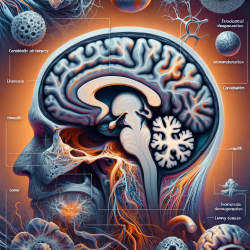Introduction
As practitioners in the field of mental health and education, we are constantly seeking effective methods to support our students and clients. A recent study titled "Process Evaluation of a Randomized Controlled Trial of Group Support Psychotherapy for Depression Treatment Among People with HIV/AIDS in Northern Uganda" offers compelling insights into how Group Support Psychotherapy (GSP) can be a transformative approach for treating depression in people living with HIV/AIDS.
Understanding the Study
The research conducted in Northern Uganda compared the effects of GSP with Group HIV Education (GHE) among individuals with HIV/AIDS. The study aimed to evaluate the feasibility, acceptability, and effectiveness of GSP in reducing depression symptoms and improving overall functioning.
Key Findings
- Feasibility and Acceptability: GSP was found to be both feasible and acceptable, with high participation rates and positive feedback from participants.
- Mediating Factors: The study identified that improved emotional and social support, better coping strategies, and the pursuit of livelihoods were significant mediating factors in reducing depression symptoms.
- Cultural Sensitivity: The culturally sensitive content of the GSP intervention facilitated its delivery and acceptance among participants.
Implications for Practitioners
For practitioners looking to enhance their therapeutic approaches, the study suggests several actionable insights:
- Incorporate Group Support: Consider integrating group support psychotherapy into your practice, especially for clients dealing with depression and social isolation.
- Focus on Cultural Sensitivity: Tailor interventions to be culturally sensitive to increase acceptance and effectiveness.
- Enhance Social Support: Encourage the development of social networks and support systems as part of the therapeutic process.
Encouraging Further Research
While the findings are promising, further research is encouraged to explore the long-term effects of GSP and its applicability in different cultural contexts. Practitioners are invited to contribute to this growing body of knowledge by conducting similar studies in their regions.
Conclusion
The study on GSP in Northern Uganda highlights the potential of group-based interventions in addressing depression among people living with HIV/AIDS. By adopting these practices, practitioners can make a significant impact on the mental health and well-being of their clients.
To read the original research paper, please follow this link: Process Evaluation of a Randomized Controlled Trial of Group Support Psychotherapy for Depression Treatment Among People with HIV/AIDS in Northern Uganda.










